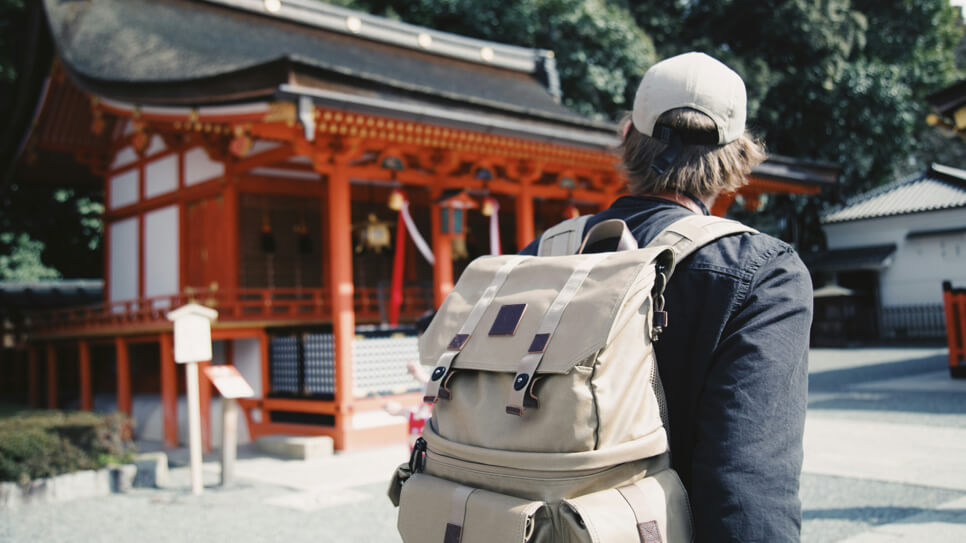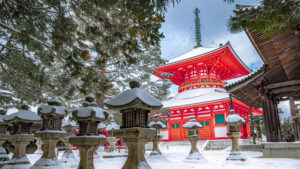Japan is a country full of charm, where beautiful nature, rich history, and modern city life come together. For first-time overseas travelers, unique customs and transportation systems can sometimes be confusing. This article introduces essential tips to help you enjoy a comfortable and enjoyable trip. From preparation to safety measures, reading this guide will make your journey to Japan much more approachable.
Contents
Preparing for Your Trip to Japan and What to Bring
Book Your Accommodation Early
Accommodations in Japan become very crowded during tourist seasons and holidays.
Especially in popular cities and tourist spots, it is important to book your stay early.
Check your preferred accommodations in advance on booking sites or official websites, comparing prices, locations, and reviews.
Also, reviewing the cancellation policies beforehand will give you peace of mind.
Pack Light and Bring Only What You Need
Japan’s transportation system is highly developed, but you will often transfer trains and walk a lot, so it’s recommended to pack as lightly as possible.
Choose versatile clothing and a small suitcase, avoiding heavy luggage.
Since many items can be purchased locally, limiting your belongings to the essentials will make traveling easier.
Prepare a Pocket Wi-Fi or SIM Card
To use the internet comfortably in Japan, renting a pocket Wi-Fi or purchasing a prepaid SIM card is recommended.
Many services allow you to pick up devices at the airport, so compare prices and connection speeds before deciding.
Having internet access is essential for map navigation, translation apps, and checking travel information on your smartphone.
Check Japan’s Voltage and Plug Type
Japan uses a 100V electrical system and A-type plugs (two flat parallel pins).
If you plan to use electronic devices from overseas, check if they support this voltage.
If not, prepare a voltage converter or plug adapter.
Most smartphone chargers are compatible, but it’s best to double-check to avoid issues.
Prepare Clothing Suitable for the Season
Japan has four distinct seasons, and the climate varies by region.
In spring and autumn, temperatures can vary greatly, so layering clothes is convenient.
Summer tends to be hot and humid, while winters—especially in northern Japan—can be very cold, requiring proper cold-weather gear.
Check the weather forecast and average temperatures for your travel destination and pack accordingly to stay comfortable.
Using Japan’s Public Transportation
Purchasing and Using the Japan Rail Pass
The Japan Rail Pass (JR Pass) is a special ticket for foreign tourists that allows unlimited travel on JR trains nationwide for a set period. It must be purchased online or through travel agencies before arriving in Japan, and exchanged for the actual pass at airports or major stations. It’s helpful to decide the start date of validity beforehand and learn how to use it and pass through ticket gates.
Basics of Riding Trains and Buses
Japan’s public transportation is punctual and easy to use, but first-timers may find transfers and route maps a bit complicated. Prepare tickets or IC cards in advance, and check directions using station signs or smartphone apps. For buses, knowing where to board, how to press the stop button, and where to get off beforehand is reassuring.
How to Use IC Cards Like Suica and Pasmo
Suica and Pasmo are transportation IC cards widely used in major Japanese cities. Simply tap them on the card reader at ticket gates to ride trains and buses. You can recharge them easily at ticket machines or convenience stores. Using IC cards means you don’t need to carry cash for fares, making sightseeing more convenient.
Avoid Rush Hour Crowds
In major cities like Tokyo, rush hour peaks between 7:30–9:30 AM and 5:00–7:00 PM. Trains can become extremely crowded, making boarding difficult. Avoiding travel during these times will make your trip more comfortable.
Check the Last Train Times
Most Japanese trains have a last service (last train) running late at night, with times varying by city and line. If you plan to stay out late sightseeing, it’s important to check last train schedules in advance. Missing the last train usually means taking a taxi, which can be very expensive.
Japanese Manners and Culture
Tipping Is Generally Not Required
In Japan, tipping is almost never practiced. Service charges are usually included in restaurants, taxis, and hotels, so there is no need to give extra tips. In fact, offering a tip may confuse the recipient, so it’s best to simply express your gratitude with words.
The Culture of Removing Shoes and Using Slippers
In many Japanese homes and traditional facilities, it is customary to remove your shoes before entering. Shoes are neatly arranged at the entrance, and guests typically change into slippers. Similar rules often apply in ryokan (traditional inns) and some shops, so follow the provided guidance. Sometimes, there are separate slippers for the restroom, so using them appropriately is considered polite.
Garbage Separation Rules and Trash Bin Availability
Japan has strict garbage separation rules. Waste must be divided into categories such as burnable, non-burnable, and recyclables (plastic bottles, PET bottles, etc.). Public trash bins are scarce, especially at stations and public facilities, so it is recommended to carry your trash with you until you find a proper disposal spot. Preparing to take your garbage home with you is convenient.
Maintaining Quietness in Public Spaces
Quietness is expected in public places. Loud conversations and phone calls on trains, waiting rooms, and other public areas are discouraged to avoid disturbing others. Respecting these manners helps maintain a comfortable environment for everyone.
Respecting Queues and Waiting Your Turn
In Japan, it is very important to wait patiently in line and respect the order. When lining up in front of shops or public facilities, never cut in line, and avoid causing conflicts with others. Many places mark the end of the line with signs or tape, so be sure to confirm where to queue properly.
Key Points for Communicating in Japanese
Simple Japanese Phrases Useful for Travel
Learning basic Japanese phrases can make communication much smoother during your trip. Common phrases include “すみません” (Excuse me), “ありがとうございます” (Thank you), “これはいくらですか?” (How much is this?), and “助けてください” (Please help me). Knowing simple greetings and expressions of thanks can leave a positive impression.
Places Where English Is More or Less Understood
English is relatively understood in major tourist areas, hotels, airports, and main train stations in large cities. However, in rural areas, small shops, and public facilities, English proficiency tends to be limited. It’s important to prepare necessary phrases in advance and use translation apps as needed.
Using Google Maps and Translation Apps Effectively
Google Maps is very useful for checking public transportation and store locations in Japan. It provides accurate route searches and walking directions, helping you reach your destination without getting lost. Translation apps also help with menus and signage. Download them beforehand so you can use them offline.
Tips for Conversations in Shops
When ordering or asking questions in shops, listen carefully until the staff finishes speaking and respond with a smile. Many stores can be busy, so keep your language concise and polite. Pointing or using gestures is also effective when language is a barrier.
Simple Expressions to Show Gratitude
“ありがとう” (Thank you) and “ありがとうございます” (Thank you very much) are the most basic expressions of gratitude. To be more polite, say “どうもありがとうございます.” Expressing thanks, even for small things, helps foster smooth communication with others.
Dining and Eating Tips
Basic Japanese Dining Manners
Japanese dining has unique manners. For example, it is acceptable to slurp only noodle dishes, while rice is usually eaten quietly. Avoid standing chopsticks upright in your bowl or passing food directly from chopstick to chopstick. It is also customary to say “いただきます” (Itadakimasu) before eating and “ごちそうさまでした” (Gochisosama deshita) after finishing your meal.
Eating in Public Places
In Japan, it is generally discouraged to eat while using public transportation or inside train stations. It is polite to enjoy your food in designated eating areas or restaurants.
Chopstick Etiquette
There are detailed rules for using chopsticks. For instance, pointing chopsticks at others or stabbing food with them is considered rude. When not using chopsticks, place them on a chopstick rest. During the meal, place chopsticks neatly on your plate or bowl when setting them down.
Handling Food Allergies and Vegetarian Requests
Many Japanese restaurants do not commonly cater to food allergies or vegetarian diets. Prepare English phrases or menus explaining your needs in advance, and communicate them to staff. Using dedicated apps or cards for allergies and dietary restrictions can also be helpful.
Recommended Japanese Dishes and How to Order
Japan offers a wide variety of iconic dishes such as sushi, tempura, ramen, and wagyu beef. When ordering, refer to menus with photos or English descriptions, and don’t hesitate to ask the staff if unsure. Sharing small plates or trying set menus is also a good way to experience different flavors.
Convenient Tips for Sightseeing
Booking and Avoiding Crowds at Popular Tourist Spots
Popular destinations like Kyoto and Tokyo can become very crowded, especially during peak seasons. Booking tickets and tours online in advance helps avoid long waiting times. Visiting early in the morning, late in the afternoon, or on weekdays also makes it easier to avoid crowds.
Using Rental Cars or Buses for Rural Travel
When exploring rural areas outside major cities, public transportation options may be limited. Renting a car offers greater freedom and allows you to visit tourist spots more efficiently. Also, check bus schedules in advance to plan your trip safely.
Recommended Seasonal Events and Festivals
Japan offers a wide variety of charming festivals and events throughout the year. From spring cherry blossom festivals and summer fireworks, to autumn foliage viewing and winter snow festivals, researching seasonal events can enrich your travel experience.
Tips for Choosing Souvenirs
Each region in Japan has unique souvenirs such as traditional sweets, crafts, and specialty foods, many of which are high quality. Besides airport and station shops, local specialty stores and markets are great places to find authentic gifts. Be sure to check expiration dates and transportation methods before purchasing.
Toilet Facilities and How to Use Them
Japanese toilets are clean and well-equipped, but many feature advanced functions that can be confusing. In addition to Western-style toilets, some places still have traditional squat toilets. Toilet paper is usually provided, so carrying your own is unnecessary. It’s helpful to know where public restrooms are located in advance.
Safety and Emergency Measures
Preparing for Earthquakes and Tsunamis
Japan is prone to earthquakes. Before your trip, familiarize yourself with basic evacuation procedures in case of an earthquake or tsunami. Know the evacuation routes at your accommodation and the nearest shelters. When you feel shaking, ensure your personal safety immediately. Installing disaster alert apps on your smartphone can help you receive timely information.
Knowing Emergency Contact Numbers
Remember Japan’s emergency numbers: 110 for police and 119 for fire and ambulance services. Even if you don’t speak Japanese, simple English communication is usually possible. Keep a note of your accommodation’s address and contact details for quick reference.
Don’t Forget to Get Travel Insurance
Make sure to have overseas travel insurance to cover illness, injury, theft, and other troubles during your trip. Review the policy carefully and carry emergency contact numbers and your insurance certificate on your smartphone or in print.
Characteristics and Precautions Regarding Japan’s Safety
Japan is known for its excellent safety worldwide, but petty crimes like pickpocketing and scams do occur. Keep a close eye on your belongings in crowded places and avoid suspicious individuals. It’s also safer to avoid walking alone late at night in certain areas.
What to Do if You Experience Theft or Trouble
If you encounter theft or other issues, report them to the police immediately. Many police stations have English-speaking staff. In case of lost credit cards, contact your card company promptly to freeze your accounts. Also, seek support from your accommodation or travel agency.
How to Enjoy Your Trip to Japan Even More
To have a successful trip to Japan, it is essential to prepare in advance and understand local manners. Be sure to book accommodations early, learn how to use public transportation, master dining etiquette, and pick up useful communication tips. Don’t forget to plan for avoiding crowds and know what to do in emergencies. By respecting Japan’s unique culture and customs, you can enjoy your journey with peace of mind. We hope the points introduced in this article will help make your experience in Japan truly memorable.












